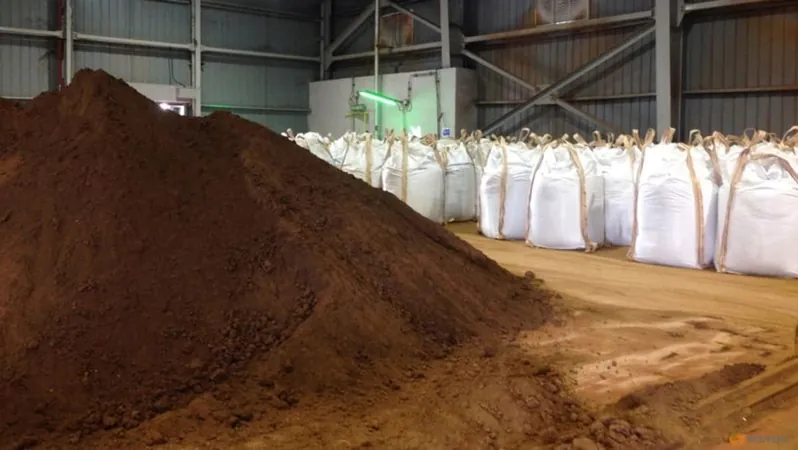
Malaysia Aims to Become a Global Leader in Rare Earth Minerals
2025-08-21
Author: Wei
The Rise of Rare Earth Processing in Malaysia
KUALA LUMPUR — Malaysia is stepping onto the global stage as a pivotal player in the rare earth supply chain, boasting the largest heavy rare earth processing plant outside of China. The Lynas Advanced Materials Plant, owned fully by Australia's Lynas Rare Earths, is situated in Gebeng, Pahang, and processes a staggering 1,500 tonnes of heavy rare earths each year.
These rare earth elements, such as dysprosium and terbium, are crucial for crafting heat-resistant magnets used in high-tech applications from defense tech to electric vehicles. Since commencing operations over a decade ago, Lynas has invested more than $700 million in Malaysia and injected over $1 billion into the local economy.
Forging New Collaborations
Looking ahead, Lynas is not resting on its laurels. CEO Amanda Lacaze recently inked a Memorandum of Understanding with Kelantan's state investment arm to explore local sources of rare earth carbonate, potentially diversifying their feedstock supplies.
Moreover, the company is collaborating with South Korean magnet manufacturer JS Link in Kuantan, with plans to produce up to 3,000 tonnes of super magnets annually. These strategic initiatives are set to fuel Malaysia's burgeoning rare earth ecosystem.
A Vision for the Future
Malaysia currently captures 13% of the global critical mineral market, and the government plans to ramp up this presence. With estimated rare earth deposits worth over $200 billion, there's a significant push for collaboration across state and federal authorities to fully harness these resources.
Prime Minister Anwar Ibrahim unveiled a five-year strategy to accelerate the development of rare earth processing capabilities. He emphasized building a domestically-driven ecosystem—mining, processing, and manufacturing magnets—all aimed at strong midstream and downstream industry growth.
Navigating Challenges and Seeking Investments
As Malaysia aspires to emerge as a key competitor in the global arena, it faces a technological gap, particularly in refining and separating rare earth elements. To overcome this hurdle, the government is actively seeking foreign investments, including from China.
During a recent visit by Chinese President Xi Jinping, rare earth processing became a focal point for enhanced bilateral cooperation. Malaysia hopes to establish a rare earth refinery with Chinese support, even amidst China's own restrictions on exporting critical processing technologies.
Environmental Safeguards Needed
While the potential for profit is enticing, experts caution against hastily tapping into these resources without proper regulatory frameworks and environmental protections. Former minister Nik Nazmi Nik Ahmad stressed the importance of sustainability and responsible practices in mining.
The federal government has imposed rigorous guidelines for rare earth mining, but enforcement remains a challenge due to the autonomy of state governments over land use. Analysts express concerns over illegal mining and the need for standard operating procedures, particularly in states like Terengganu, Kelantan, and Pahang, where the majority of resources lie.
Seizing Market Opportunities
Given the shifting global landscape—exacerbated by the ongoing US-China trade tensions—experts believe Malaysia must act decisively to advance in high-value downstream industries. With a midstream ecosystem already in place, analysts urge the nation to capitalize on the current demand for rare earths.
"While the world is diversifying its supply chains, Malaysia stands in a prime position to make its mark," emphasized analyst Qarrem Kassim. The stakes are high, and the time to act is now.



 Brasil (PT)
Brasil (PT)
 Canada (EN)
Canada (EN)
 Chile (ES)
Chile (ES)
 Česko (CS)
Česko (CS)
 대한민국 (KO)
대한민국 (KO)
 España (ES)
España (ES)
 France (FR)
France (FR)
 Hong Kong (EN)
Hong Kong (EN)
 Italia (IT)
Italia (IT)
 日本 (JA)
日本 (JA)
 Magyarország (HU)
Magyarország (HU)
 Norge (NO)
Norge (NO)
 Polska (PL)
Polska (PL)
 Schweiz (DE)
Schweiz (DE)
 Singapore (EN)
Singapore (EN)
 Sverige (SV)
Sverige (SV)
 Suomi (FI)
Suomi (FI)
 Türkiye (TR)
Türkiye (TR)
 الإمارات العربية المتحدة (AR)
الإمارات العربية المتحدة (AR)